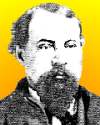 (source)
(source)
|
George Brayton
(3 Oct 1830 - 17 Dec 1892)
American engineer who invented the first commercial gas internal combustion engine. Its principle of continuous ignition later became the basis for the turbine engine.
|
George Brayton
Obituary - Cassier's Magazine, (1912)

George B. Brayton, pioneer in the development of the internal-combustion engine, and a most brilliant mechanic and investigator, was born at Compton, Rhode Island, in 1830. He received his education at a school in a village called Pond Factory, and early showed an inclination toward mechanics, making a little water-wheel and hammer at the early age of 4½ years. His father was the superintendent of a cotton factory, and invented several attachments to looms, from the proceeds of which he purchased a farm near Warwick, R. I., where George made his first experiments upon combustion in a cylinder, using camphene as a fuel; this was in the year 1853.
Brayton learned his trade as a machinist at “Tom Hill's” machine shop in Providence, and at the Corliss Engine Works. Among his early inventions were a breech-loading gun, and a riveting machine for tank and gasometer work. In 1848 he turned his attention to steam boiler design, and invented the sectional steam generator, called the Exeter boiler, extensively manufactured by the Exeter Machine Works, of Exeter, N. H.
The internal-combustion engine, by which Brayton's name is best remembered, was first developed by him at Bricksburg, N. J., about 1870, and began to attract attention by 1873, after tests and a report by Professor Thurston, and by exhibition before the Franklin Institute, and is remarkable in that it employed a cycle of controlled combustion similar to that since so widely developed by Diesel and others. The “Ready Motor,” as it was called, used oil fuel directly in the cylinder without a carburetter, and had a separate compression pump for the air supply, and worked steadily and more efficiently than any combustion engine produced to that time.
In 1878 its construction was undertaken in England by Messrs. Simon, of Nottingham. After the introduction of gas engines of the Beau-de-Rochas type, the Brayton engine fell into disuse, but it is now realized that the machine was a most important and original invention, and that the principle upon which it was designed is the one governing the modern successful oil engine of maximum efficiency. Brayton died at Kingbury, England, December 17, 1892, and his remains were interred at Providence, R.I., January 24. 1893.

- 3 Oct - short biography, births, deaths and events on date of Brayton's birth.
- George Brayton's Engine in Boat Trial - Experimental use of a Brayton engine to power watercraft, described in a letter in Manufacturer and Builder (1880)
- George Brayton's Engine - from Transactions of the ASME (1902).
- George Brayton's Engine - A description originally written in 1875, and updated in Johnson's (revised) Universal Cyclopaedia.
- The Brayton Engine and Cycle and Use of the Brayton Engine - from The Automobile Book: A Practical Treatise (1916), by Charles E. Duryea, James Edward Homans.
- Internal Fire: The Internal-Combustion Engine 1673-1900, by C. Lyle Cummins, Jr. - book suggestion.




